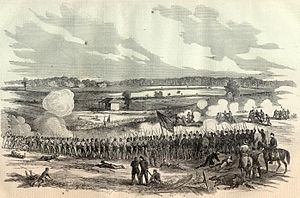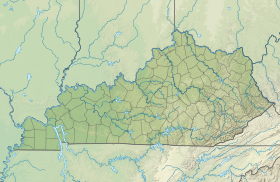| Battle of Perryville | |||||||
|---|---|---|---|---|---|---|---|
| Part of the American Civil War | |||||||
 The Battle of Perryville as depicted in Harper's Weekly | |||||||
| |||||||
| Belligerents | |||||||
|
|
| ||||||
| Commanders and leaders | |||||||
|
|
| ||||||
| Units involved | |||||||
| Army of the Ohio | Army of Mississippi[a] | ||||||
| Strength | |||||||
|
55,000[1] (22,000 engaged)[2] | 16,000[3] | ||||||
| Casualties and losses | |||||||
| 4,241 | 3,396 | ||||||
Location of Perryville in Kentucky | |||||||
The Battle of Perryville, also known as the Battle of Chaplin Hills, was fought on October 8, 1862, in the Chaplin Hills west of Perryville, Kentucky, as the culmination of the Confederate Heartland Offensive (Kentucky Campaign) during the American Civil War. Confederate Gen. Braxton Bragg's Army of Mississippi[b] initially won a tactical victory against primarily a single corps of Maj. Gen. Don Carlos Buell's Union Army of the Ohio. The battle is considered a strategic Union victory, sometimes called the Battle for Kentucky, since Bragg withdrew to Tennessee soon thereafter. The Union retained control of the critical border state of Kentucky for the remainder of the war.
On October 7, Buell's army, in pursuit of Bragg, converged on the small crossroads town of Perryville in three columns. Union forces first skirmished with Confederate cavalry on the Springfield Pike before the fighting became more general, on Peters Hill, when the Confederate infantry arrived. Both sides were desperate to get access to fresh water. The next day, at dawn, fighting began again around Peters Hill as a Union division advanced up the pike, halting just before the Confederate line. After noon, a Confederate division struck the Union left flank—the I Corps of Maj. Gen. Alexander M. McCook—and forced it to fall back. When more Confederate divisions joined the fray, the Union line made a stubborn stand, counterattacked, but finally fell back with some units routed.[8]
Buell, several miles behind the action, was unaware that a major battle was taking place and did not send any reserves to the front until late in the afternoon. The Union troops on the left flank, reinforced by two brigades, stabilized their line, and the Confederate attack sputtered to a halt. Later, three Confederate regiments assaulted the Union division on the Springfield Pike but were repulsed and fell back into Perryville. Union troops pursued, and skirmishing occurred in the streets until dark. By that time, Union reinforcements were threatening the Confederate left flank. Bragg, short of men and supplies, withdrew during the night, and continued the Confederate retreat by way of Cumberland Gap into East Tennessee.[8]
Considering the casualties relative to the engaged strengths of the armies,[3] the Battle of Perryville was one of the bloodiest battles of the Civil War. It was the largest battle fought in the state of Kentucky.[9]
Cite error: There are <ref group=lower-alpha> tags or {{efn}} templates on this page, but the references will not show without a {{reflist|group=lower-alpha}} template or {{notelist}} template (see the help page).
- ^ Further information: Official Records, Series I, Volume XVI, Part 2, pages 562-564.
- ^ Kennedy, p. 127. The entire Army of the Ohio (present for duty) was approximately 55,000 men (Cameron, p. 197, cites 55,261 men; National Park Service, cites 55,000). See in this article Opposing forces and Perryville Union order of battle.
- ^ a b Kennedy, p. 127.
- ^ Further information: Official Records, Series I, Volume XVI, Part 1, pages 1033-1036.
- ^ Noe, p. 373, cites 4,276 (894 killed; 2,911 wounded; 471 captured/missing)
- ^ Further information: Official Records, Series I, Volume XVI, Part 1, page 1112.
- ^ Noe, p. 369, cites 3,401 (532 killed; 2,641 wounded; 228 captured/missing).
- ^ a b NPS.
- ^ Eicher, p. 367.
